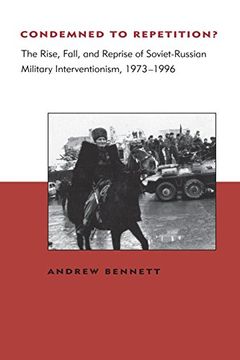Compartir
Condemned to Repetition? The Rise, Fall, and Reprise of Soviet-Russian Military Interventionism, 1973-1996 (Bcsia Studies in International Security) (Belfer Center Studies in International Security) (en Inglés)
Andrew Bennett (Autor)
·
The Mit Press
· Tapa Blanda
Condemned to Repetition? The Rise, Fall, and Reprise of Soviet-Russian Military Interventionism, 1973-1996 (Bcsia Studies in International Security) (Belfer Center Studies in International Security) (en Inglés) - Andrew Bennett
S/ 158,75
S/ 317,50
Ahorras: S/ 158,75
Elige la lista en la que quieres agregar tu producto o crea una nueva lista
✓ Producto agregado correctamente a la lista de deseos.
Ir a Mis Listas
Origen: España
(Costos de importación incluídos en el precio)
Se enviará desde nuestra bodega entre el
Miércoles 19 de Junio y el
Viernes 28 de Junio.
Lo recibirás en cualquier lugar de Perú entre 2 y 5 días hábiles luego del envío.
Reseña del libro "Condemned to Repetition? The Rise, Fall, and Reprise of Soviet-Russian Military Interventionism, 1973-1996 (Bcsia Studies in International Security) (Belfer Center Studies in International Security) (en Inglés)"
Why did the Soviet Union use less force to preserve the Soviet empire from 1989 to 1991 than it had used in distant and impoverished Angola in 1975? This book fills a key gap in international relations theories by examining how actors' preferences and causal conceptions change as they learn from their experiences. Andrew Bennett draws on interviews and declassified Politburo documents as well as numerous public statements to establish the views of Soviet and Russian officials. He argues that Soviet leaders drew lessons from their apparent successes in Vietnam and elsewhere in the 1970s that made them more interventionist. Then, as casualties in Afghanistan mounted in the 1980s, Soviet leaders learned different lessons that led them to withdraw from regional conflicts and even to abstain from the use of force as the Soviet empire dissolved. The loss of this empire led to exaggerated fears of "domino effects" within Russia and a resurgence of interventionist views, culminating in the Russian invasion of Chechnya in 1994. Throughout this process, Soviet and Russian leaders and policy experts were divided into competing schools of thought as much by the information to which they were exposed as by their apparent material interests. This helps explain how Gorbachev and other new thinkers were able to prevail over the powerful military-party-industrial complex that had dominated Soviet politics since Stalin's time.
- 0% (0)
- 0% (0)
- 0% (0)
- 0% (0)
- 0% (0)
Todos los libros de nuestro catálogo son Originales.
El libro está escrito en Inglés.
La encuadernación de esta edición es Tapa Blanda.
✓ Producto agregado correctamente al carro, Ir a Pagar.

